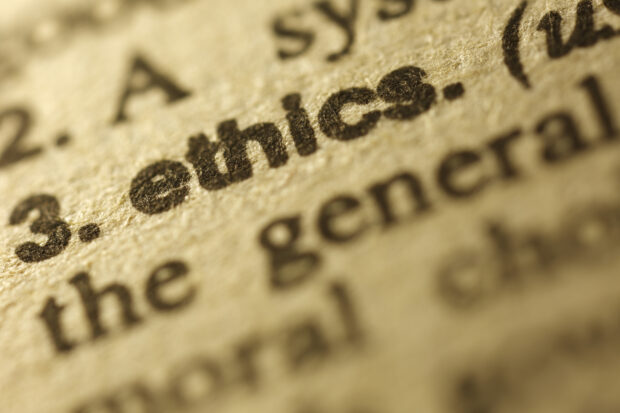
Ed. note: Please welcome Renee Knake Jefferson back to the pages of Above the Law. Subscribe to her Substack, Legal Ethics Roundup, here.
Welcome to what captivates, haunts, inspires, and surprises me every week in the world of legal ethics.

How Filevine’s New DraftAI Cuts Out Hours Of Writing Work
Now it transforms your document creation with natural language prompts.
Happy First Monday!
On the first Monday of each month, you get a longer version of the Roundup with recent headlines plus reading recommendations, job postings, events, and other features, including a new “Deep Dive” section where we will take a closer look at one of last month’s headlines. It was another week overwhelmed by legal ethics news, but before we review the headlines let’s talk protests.
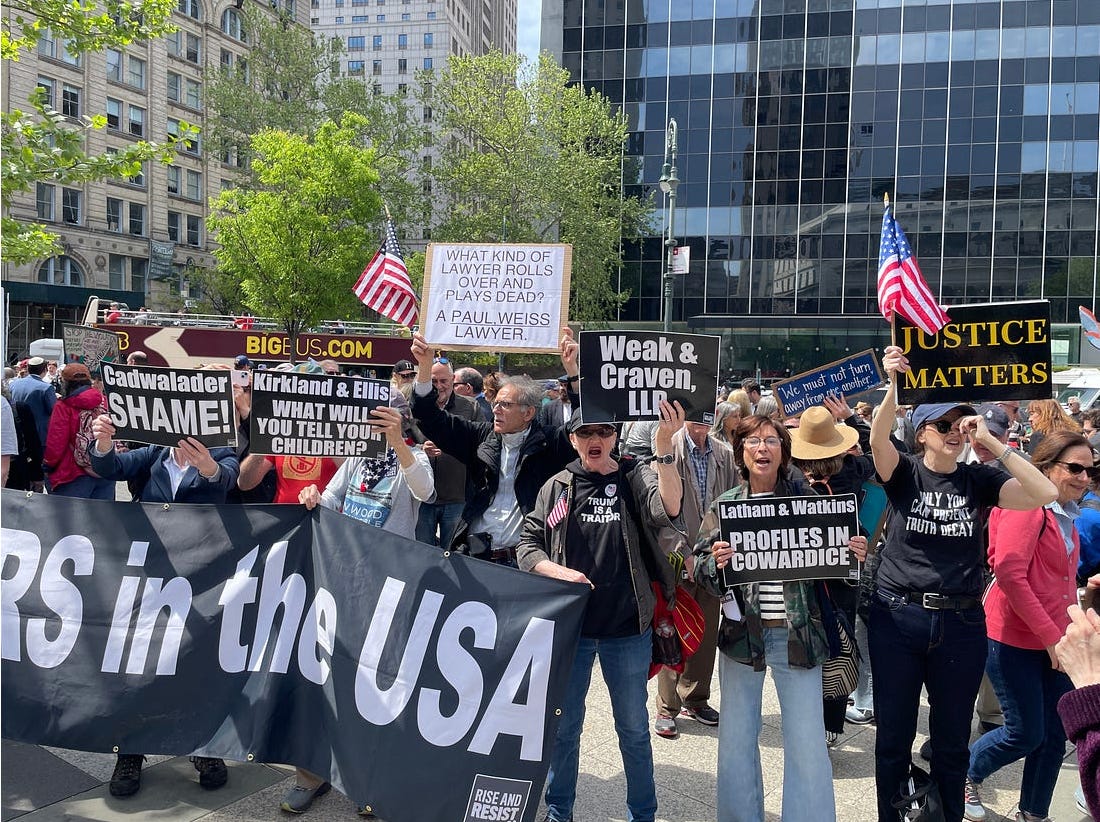
“I’ve never seen a protest with this many people in suits.” Thanks to excellent reporting from David Lat in his Substack newsletter Original Jurisdiction, we have a photo essay documenting the NYC Rally for the Rule of Law that makes you almost feel like you were there. The rally was held on May 1, established as “Law Day” by President Dwight Eisenhower May 1, 1958, as a day of national dedication to the principles of government under law. (See here for more on that history.) I’ve included two of Lat’s photos but it is well worth your time to take a look at his whole post documenting the event. According to Lat: “In New York City, an estimated 1,500 to 2,000 demonstrators gathered in Foley Square, across the street from federal and state courthouses, to rally for the rule of law—and to protest recent attacks upon it.”

How LexisNexis State Net Uses Gen AI To Tame Gov’t Data
Its new features transform how you can track and analyze the more than 200,000 bills, regulations, and other measures set to be introduced this year.
This was just one of many protests across the country held by lawyers. From the New York Times: “On Thursday, thousands of lawyers were expected to protest at federal courthouses in New York, Chicago and San Francisco — roughly 50 cities in all. … It was not exactly an untrammeled street protest. The jurists voiced their disapproval by ceremonially reaffirming their oath to uphold the rule of law and reciting the Pledge of Allegiance. But the fact that lawyers were demonstrating at all, organizers said, underscored the seriousness of the moment. ‘If lawyers are taking to the streets, it means something very serious and bad is happening,’ said Traci Feit Love, the executive director of Lawyers for Good Government, a nonprofit that helped coordinate the events.” Read more here (gift link).
I didn’t attend a protest, but I’m in the midst of writing a piece tentatively titled “The Legal Ethics of Protest.” Needless to say, this past week gave me a lot to reflect upon as I finish up that draft.
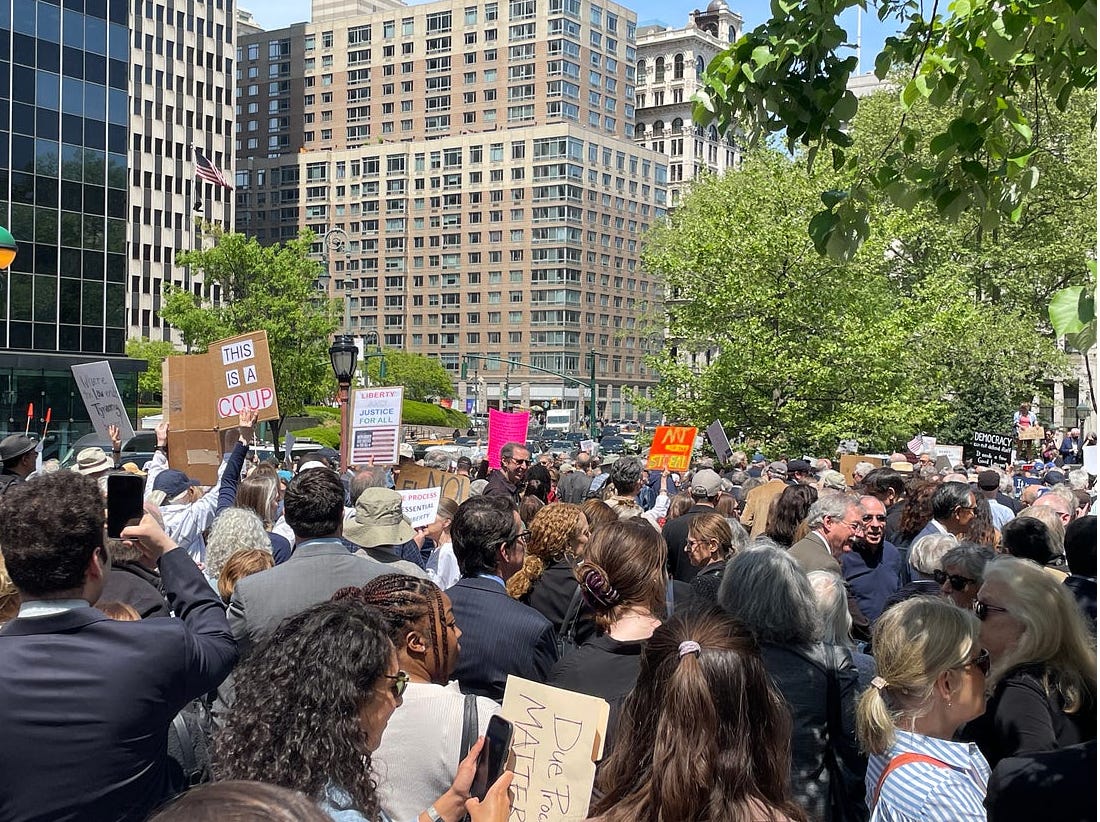
And now for the headlines.
Highlights from Last Week – Top Fifteen Headlines
#1 “Judge Strikes Down Trump Order Targeting Law Firm Perkins Coie.” From the Wall Street Journal: “A federal judge on Friday permanently blocked an executive order from President Trump targeting the law firm Perkins Coie, declaring it unconstitutional, in the most decisive blow yet against Trump’s campaign to rein in some of the legal world’s most prominent firms. The ruling from U.S. District Judge Beryl Howell in Washington, D.C., is likely to serve as a model for judges weighing cases brought by other firms fighting back against similar orders. The sharply worded 102-page opinion rebuked the administration’s order and its motivations, saying the case presented an ‘unprecedented attack’ on foundational principles to ensure lawyers have ‘crucial independence’ from any group that wields power.” Read more here (gift link) and scroll down to Recommended Reading for a longer excerpt from the opinion. It seems likely that the Executive Order threatening Jenner & Block will meet a similar fate.
#2 “Judges Would Be Accountable for Abuse Even if They Retired or Resigned, Under New Bill.” From National Public Radio: “A top lawmaker is introducing legislation that aims to increase accountability for federal judges accused of misconduct and abuse. The new bill from Rep. Hank Johnson, D-Ga., would ensure that pending investigations into judicial misconduct would continue, even if the judges under review retire or resign. Johnson is trying to close a loophole that federal judges have used to collect pension benefits despite facing credible accusations of wrongdoing by employees.” Read more here. (This reform has been in the works for a long time. I testified before the federal judiciary recommending a similar proposal back in 2018.)
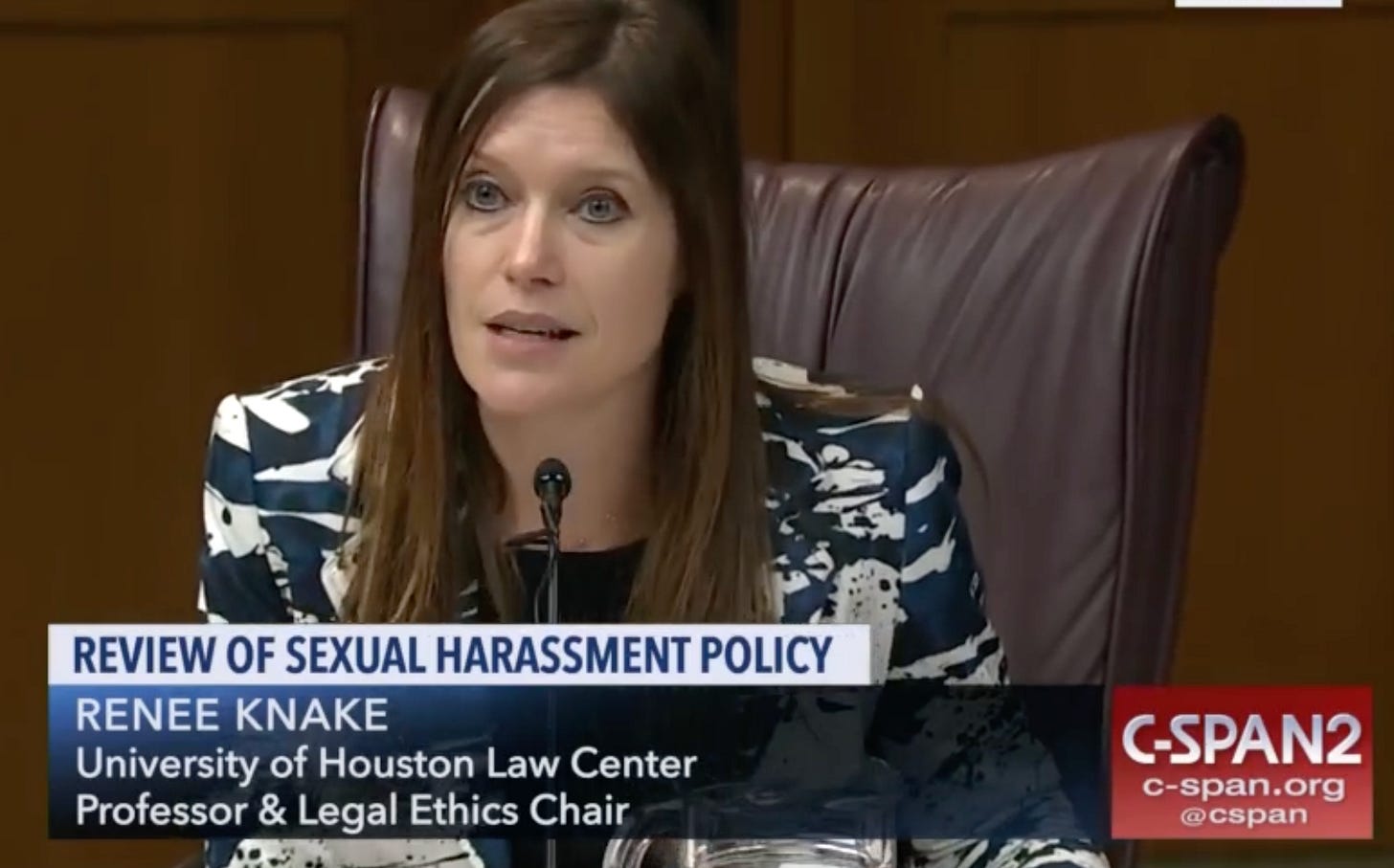
#3 “Judge Rejects Lawsuit With Dragon Logo, Calling It ‘Juvenile and Impertinent.’” From the New York Times: “A purple dragon dressed in a business suit seemed like a natural choice for a logo when Jacob A. Perrone, a lawyer in East Lansing, Mich., recently opened a new firm and named it Dragon Lawyers. He noted that some lawyers liked to call themselves ‘bulldogs’ and said the dragon symbolized ‘aggressive representation.’ But a federal magistrate judge, Ray Kent, was not impressed. He was so disgusted by the dragon that he struck a lawsuit filed by Mr. Perrone. … ‘Use of this dragon cartoon logo is not only distracting, it is juvenile and impertinent,’ Judge Kent wrote. ‘The Court is not a cartoon.’”Read more here (gift link).
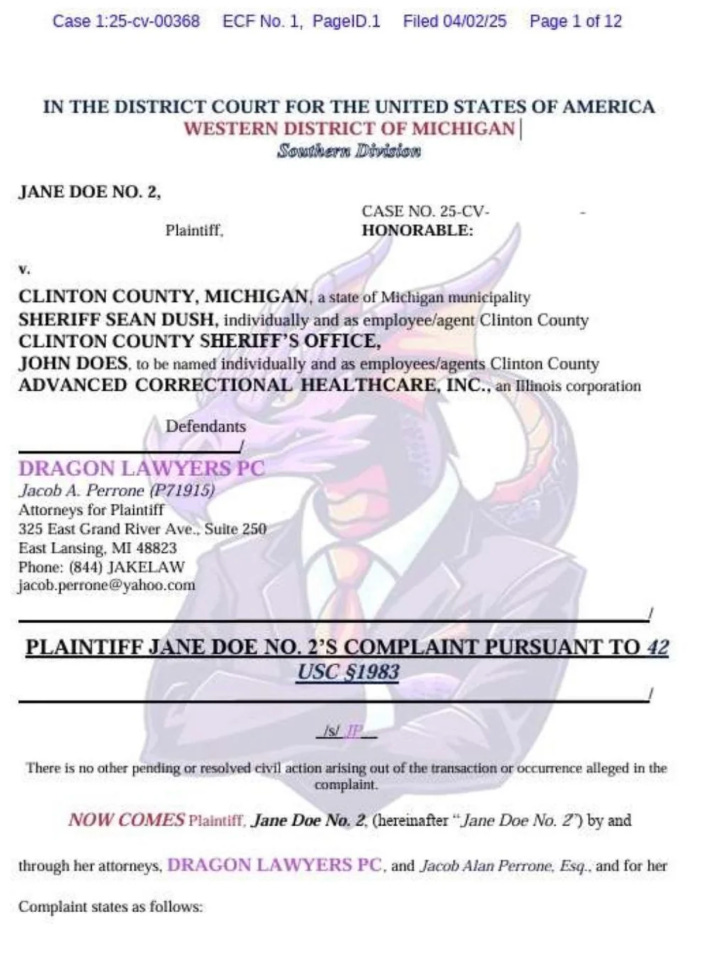
#4 “Trump’s Big Law Deals Spell Out Broad Enforcement Terms.” From Bloomberg Law: “President Donald Trump’s deal with four law firms contains no specifics about how they’re going to make good on their $500 million pledge of free legal services, but a separate agreement with the US Equal Employment Opportunity Commission requires ongoing reporting about their compliance. … In another agreement struck with the EEOC at the same time as their deal with the White House, the firms—Kirkland & Ellis, Latham & Watkins, Simpson Thacher & Bartlett, and A&O Shearman—are instructed to retain outside counsel to ensure compliance with ‘federal anti-discrimination laws’ and with the terms of their agreement, according to a copy obtained by Bloomberg Law. Outside counsel for the four firms, starting on July 11, 2025, shall submit ‘a confidential written certification’ every six months through January 2029, ‘which shall be shared only with the White House,’ the document said.” Read more here.
#5 Law Firm Switches from Clients and Lawyers in Wake of EOs and Other Threats. Two headlines for #5. First, from the New York Times: “Microsoft Drops Law Firm That Made a Deal With Trump From a Case. The tech giant instead engaged a firm that is fighting the president’s executive orders, Jenner & Block, in a sign that those firms can still attract clients.” Read more here (gift link). Second, from CBS News: “Abbe Lowell, a criminal defense attorney who has represented a number of high-profile political clients, is launching a new law firm to push back on President Trump’s crusade against several major practices. Lowell & Associates has hired multiple attorneys who left firms that cut deals with the Trump administration as the president sought to punish prominent practices to settle his long-held grievances against his political opponents. Mr. Trump has issued executive orders targeting major law firms that represented his political opponents, were involved in legal challenges against him or hired attorneys connected to the investigations into him. Lowell’s previous clients include Mr. Trump’s daughter, Ivanka Trump, and son-in-law, Jared Kushner; former President Joe Biden’s son, Hunter Biden; and former Democratic Sen. Bob Menendez of New Jersey.” Read more here.
#6 “Ex-Federal Judges Group to Defend Judicial Independence.” From Bloomberg Law: “A group of 20 former federal judges have formed a coalition to defend the ‘independence and integrity of the judiciary’ as threats against the courts and individual judges mount under the Trump administration. Members of the Article III Coalition have signed onto a letter made public Thursday in which they ‘pledge not only to keep our Republic, but to strengthen it. To defend the rule of law. To protect the independence of the judiciary. To kindle and inspire an informed citizenry. And to dedicate ourselves to the unending duty of protecting our sacred democracy.’ The nearly two dozen former circuit and district jurists appointed by Republican and Democratic administrations plan to appear at public forums and town halls across the country, directly engage with the media and public, and make public statements to ‘defend the constitutional role and independence of the federal judiciary,’ according to a release accompanying the letter.” Read more here.
#7 “Trump Executive Order Seeks Law Firms to Defend Police Officers for Free.” From Reuters: “President Donald Trump has directed the U.S. Justice Department to mobilize law firms to defend police officers unjustly accused of misconduct free of charge, marking the latest effort to steer the work of private lawyers to his administration’s ends. In an executive order issued on Monday, Trump said U.S. Attorney General Pam Bondi ‘shall take all appropriate action’ to support law enforcement officers facing unjust liability for performing their duties.’” Read more here. And read the full EO here.
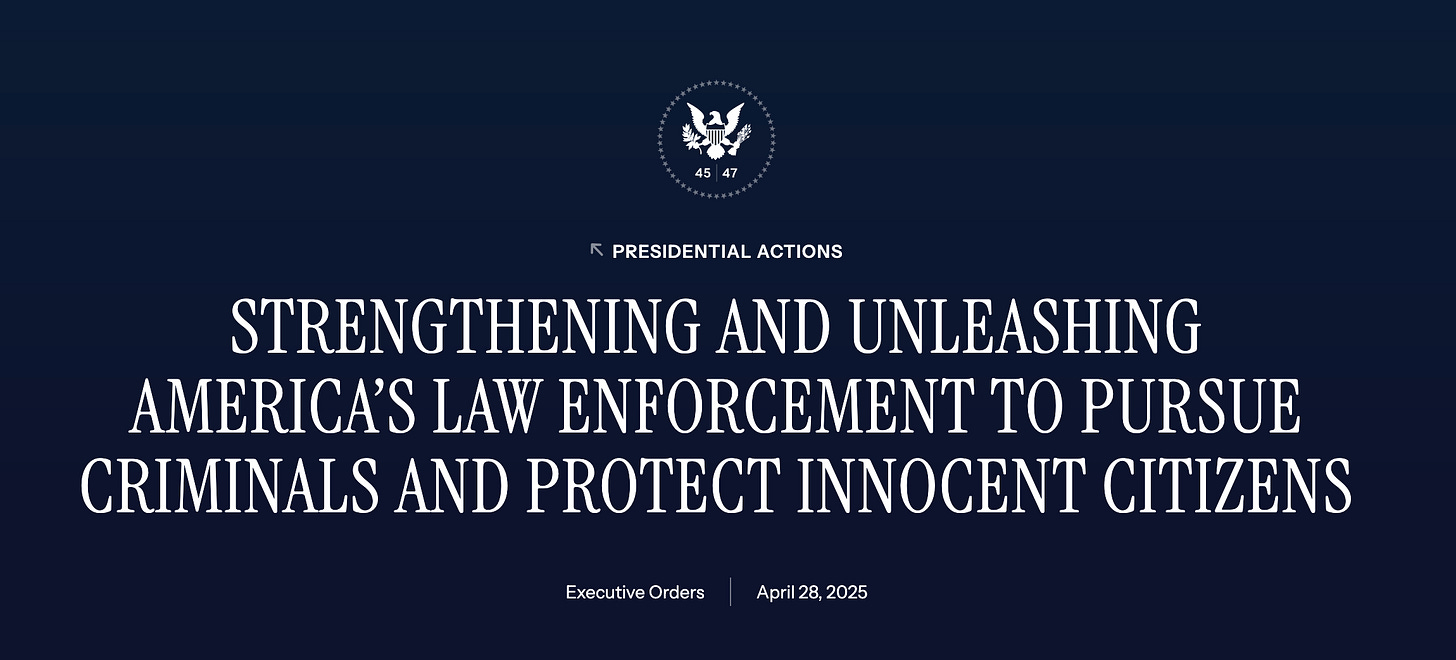
#8 “Federal Agencies Launch Title VI Investigation Into Harvard Law Review.” From the Harvard Crimson: “Two federal agencies launched investigations Monday into Harvard and the Harvard Law Review for discriminating based on race and gender in article selection and journal membership, according to a joint press release. The investigation, which will be undertaken by civil rights offices at the Department of Education and Department of Health and Human Services, will examine whether Harvard and the Law Review violated Title VI of the 1964 Civil Rights Act, which prohibits race-based discrimination. It comes three days after the Washington Free Beacon published an article accusing the Law Review of discriminating against white applicants and authors. The Free Beacon cited leaked memos and Slack messages that framed authors’ nonwhite racial identity as points in favor of publication and urged editors to consider ‘DEI factors’ in reviewing article submissions.” Read more here.
#9 “Milwaukee Judge Charged with Obstructing Immigration Agents is Relieved of Duty.” Two headlines for #9. First, from MSNBC: “The Wisconsin judge accused of obstructing federal authorities who were seeking to detain an undocumented immigrant for deportation was temporarily relieved of her duties Tuesday, an order from the state’s high court shows. The Wisconsin Supreme Court’s order bars Milwaukee County Circuit Court Judge Hannah Dugan from her position while the federal charges are adjudicated. The court, which said it was acting on its own and not in response to a request from anyone, said the order was intended to protect public confidence in Wisconsin courts.” Read more here. Second, also from MSNBC is an op-ed by Ray Brescia (Albany) in which he argues that the arrest “could have a chilling effect that spreads far beyond Wisconsin. … Today it is a judge who is alleged to have frustrated a law enforcement operation; tomorrow it might be a plaintiff or lawyer who seeks to file a case against the administration.” Read more here.
#10 “Ethical Issues Raised by Agreements Between Certain Law Firms and Donald Trump.” From Cynthia Godsoe and Evan Davis in the New York Law Journal: “The best outcome here is obvious. The agreements are not enforceable and therefore can be repudiated. The nine firms that have made these agreements should all agree to effectuate their termination. If all the targets of a protection scheme refuse to comply for ethical reasons, the scheme losses much of its force. Failing that, the New York Rules of Professional Conduct should be enforced. Hearings need to be held to provide due process and establish the facts and circumstances more fully. Mitigating factors need to be considered in determining the appropriate sanction. As noted above, victimhood is one such factor. It may well be that public censure is the appropriate sanction. This sanction is by no means a slap on the wrist because the Firms would be required to transmit the order of public censure to all of their clients and personnel.” Read more here.
#11 US Judicial Panel Advances Proposal to Regulate AI-Generated Evidence. From Reuters: “A federal judicial panel advanced a proposal on Friday to regulate the introduction of artificial intelligence-generated evidence at trial, with judges expressing a need to swiftly get feedback from the public and lawyers on the draft rule to get ahead of a rapidly evolving technology. The U.S. Judicial Conference’s Advisory Committee on Evidence Rules in Washington, D.C., voted 8-1 in favor of seeking public comment on a draft rule designed to ensure evidence produced by generative AI technology meets the same reliability standards as evidence from a human expert witness.” Read more here.
#12 “Lawyer Disbarred for ‘Shocking and Outrageous’ Conduct Files $20M Suit Against Ethics Committee.” From the ABA Journal: “A lawyer disbarred last year for using ‘unacceptably bigoted language’ doesn’t give up easily. Lawyer Rahul Dev Manchanda of New York continues to contest the decision in state and federal courts, Law.com reports. And his court filings include some of the same kind of language that led to his disbarment, the article reports. Now, Manchanda has sued the Attorney Grievance Committee for New York’s First Judicial Department. The April 18 lawsuit seeks $20 million, representing the amount of money that he said he would have made as a lawyer for the next 20 years.” Read more here.
#13 “Survey Finds Stunning Level of Agreement on a Specific Supreme Court Reform.” From the San Francisco Chronicle: “Asked who should enforce the code, 53% said it should be Congress, 32% said enforcement should be assigned to other judges … The American Bar Association survey: 90% of respondents said the nation’s highest court needs “a binding and enforceable ethics code, which already exists for lower courts.’” Read more here.
#14 The Legal Ethics of Technology. Two headlines for #14. First on AI, from the National Law Review: “A popular refrain echoes through legal technology conferences and webinars: ‘Lawyers won’t be replaced by AI, but lawyers with AI will replace lawyers without AI.’ This statement offers a degree of comfort to legal professionals navigating rapid technological advancement, suggesting AI is primarily an augmentation tool rather than a replacement. While many practitioners hope this holds true, a fundamental question remains: Is it legally possible for AI, operating independently, to replace lawyers under the current regulatory frameworks governing the legal profession? As it stands, the rules surrounding the unauthorized practice of law (UPL) in most jurisdictions present a significant hurdle.” Read more here. Second, on technology and the duty of competency, from LawSites: “In my continuing quest to track the states that have adopted the ethical duty of technology competence for lawyers, there is now another jurisdiction to add to the list: the District of Columbia. On April 7, the District of Columbia Court of Appeals approved a variety of amendments to the Rules of Professional Conduct of the D.C. Bar. Among them was a change that incorporated technology within the meaning of competent lawyering. However, it did so in a way unlike the approach taken in other states. Interestingly, this happened just days after the New Jersey Supreme Court declined to adopt the duty of technology competence.” Read more here.
#15 “Justice Department Lawyers Work for Justice and the Constitution – Not the White House.” From Cassandra Burke Robertson (Case Western) in the Ohio Capitol Journal: “In February 2025, seven DOJ attorneys resigned, rather than follow orders from Attorney General Pam Bondi to dismiss corruption charges against New York Mayor Eric Adams. Adams was indicted in September 2024, during the Biden administration, for alleged bribery and campaign finance violations. One DOJ prosecutor, Hagan Scotten, wrote in his Feb. 15 resignation letter that while he held no negative views of the Trump administration, he believed the dismissal request violated DOJ’s ethical standards. Among more than a dozen DOJ attorneys who have recently been terminated, the DOJ fired Erez Reuveni, acting deputy chief of the department’s Office of Immigration Litigation, on April 15. Reuveni lost his job for speaking honestly to the court about the facts of an immigration case, instead of following political directives from Bondi and other superiors. I’m a legal ethics scholar, and I know that as more DOJ lawyers face choices between following political directives and upholding their profession’s ethical standards, they confront a critical question: To whom do they ultimately owe their loyalty?” Read more here.
Deep Dive
I’m experimenting with a new addition to the First Monday features where we will do a deeper dive into one of the past month’s headlines. For our inaugural Deep Dive, I’m posting an excerpt from an exchange with Ben Varadi who teaches Professional Responsibility at Vermont Law School. He took his students on a “deep dive” about Jerome DeWald and his AI lawyer, covered in LER No. 85 Headline #14. Ben gave me permission to share with all of you what he wrote me about his teaching experience.
I had an extended conversation with my students this semester about Mr. DeWald and his “AI Lawyer,” mentioned in LER 85, which turned out to dovetail nicely from a comparative perspective with the material we were covering at that time on duty of candor. While the students (and I) have strong feelings about the potential for AI to increase access to justice, I think the media in its excitement didn’t adequately note that Mr. DeWald is the proprietor of https://pro-se.pro, which purports to offer AI-based tools intended to assist other pro se litigants. It appears to be a filter on top of ChatGPT, and his business logo (improperly, unless he secured a license independently) incorporates the OpenAI logo. Mr. DeWald’s LinkedIn profile (which is generally entertaining) describes the litigation at issue as an “alpha test” of that technology. He had purportedly sought to introduce the video after asserting that he was unable to speak effectively in court, thus providing the context for the judge’s irate comments relative to the long conversations he had with clerks and counsel, and her observation that she would not allow the courtroom to be used to promote his business. Mr. Dewald’s website additionally sells courses in what he describes on LinkedIn as a “law school,” including a “Juris Doctor Track.” While I haven’t confirmed, the courses and their presenters appear to be AI-generated. The “school” certainly appears to be unaccredited.
I offer these observations primarily because I did not anticipate such a rich vein of ethics considerations to be available for discussion when I first read the headlines, and it’s been a fun exploration of the risks our rules seek to guard against, as well as the opportunities and threats presented by AI.
Thanks, Ben, for sharing how you used LER headlines in your teaching.
Recommended Reading
Recommendation #1: “Unnecessary: Law Firm Executive Orders and the Necessity Defense” by David McGowan (San Diego). From the abstract:
Many law firms have submitted to demands President Trump has made in connection with executive orders or have submitted preemptively to avoid becoming the subject of such orders. Some have argued that economic necessity compelled submission, implying that criticism of the character of submitting firms is unwarranted. This paper shows that submission was not economically necessary and that criticism therefore is warranted. Because submission was not compelled by necessity, further submission is not inevitable, nor is it too late for firms that have submitted to rehabilitate their reputations.
Download from SSRN here.
Recommendation #2: “The Elected Judge” by Matthew Dale Kim (Florida). From the abstract:
Many legal scholars and jurists oppose electing judges. Their core criticism against judicial elections is that elected judges are incentivized to avoid issuing unpopular, counter majoritarian decisions in constitutional law cases and thus fail to safeguard minority rights against abuses of the majority. Scholars have described this problem as the elected judges’ “majoritarian difficulty.” Numerous empirical studies suggest that elected judges do, in fact, fear electoral backlash and allow majoritarian demands to affect their decision-making. This Article asks whether such fears are warranted. … Leveraging a series of original survey experiments, this Article first demonstrates that when voters are informed of how judges make decisions, they approve of judges who engage in principled legal analysis even if the judges issue counter majoritarian decisions that do not further the voters’ political preferences. The survey results also indicate that voters are less interested in a judge’s stance on particular issues and more focused on whether the judge engages in principled legal analysis, disregards public opinion, checks the other branches of government, and exhibits strong ethics, competence, and temperament.
Download from SSRN here.
Recommendation #3: “BigLaw’s Race Problem: Reviewing The Black Ceiling: How Race Still Matters in the Elite Workplace by Kevin Woodson” by Angela Onwuachi-Willig (Boston University) and Anthony V. Alfieri (Miami). From the abstract:
Ever since the 1970s when BigLaw firms began to hire Black lawyers into their associate ranks, these firms have wrestled with problems in both recruiting and retaining Black associates. During the ensuing decades, BigLaw firms have minimally increased the low numbers of Black attorneys who have become partners, particularly equity partners, within their organizations. Numerous scholars have explored how racial bias and discrimination, both within BigLaw firms and greater society, have contributed to such failures in the recruitment, retention, and promotion of Black lawyers. In his new book The Black Ceiling: How Race Still Matters in the Elite Workplace, Professor Kevin Woodson, a Black law professor and sociologist who once worked as an associate at a large, elite law firm, offers his own theory about how “racial discomfort,” and specifically “social alienation” and “stigma anxiety” related to race, have functioned together to create and maintain racial disparities in BigLaw attrition and partnership. This Book Review examines Woodson’s insights against the backdrop of recent high-profile employment discrimination litigation embroiling BigLaw firms across the country, focusing on one recent case, Cardwell v. Davis Polk & Wardwell LLP, in which the plaintiff, a Black former associate, alleged he had been fired in retaliation for raising concerns about racial discrimination at his law firm. The Book Review extends Woodson’s research by identifying and assessing innovative firm- and industry-wide policies that can mitigate the impact of racial discomfort on Black associates’ prospects for thriving in and attaining partnership at BigLaw firms.
Download the full review from the Columbia Law Review website here.
Recommendation #4: “Bonus 126: [Chill] All the Lawyers” by Steve Vladeck (Georgetown). An excerpt from his February Substack post (which usually is paywalled but he made available free to all for what he says are “reasons that will become obvious”):
There has long been a rich and robust debate about whether/when lawyers should be criticized or even vilified for representing unpopular clients. … One of my favorite opinions by Justice Kennedy (admittedly, it’s not a very long list) is his 2001 opinion for the Court in Legal Services Corp. v. Velazquez, in which he explained why meaningful access to lawyers is vital to the separation of powers—because courts depend upon a robust bar in order to play their role in holding the other branches of government accountable; they can’t go out and find cases on their own. On that view, with which I wholeheartedly agree, what the Trump administration is doing is far more than just bad behavior; it’s a direct threat to the rule of law—almost as much as defying court orders would be. Shakespeare’s Dick the Butcher may have suggested the need to “kill all the lawyers” before imposing authoritarian rule, but chilling lawyers into not even challenging unlawful government action may be just as effective in the long term—and should be decried and resisted just as emphatically, especially by the very law firms that are the apparent downstream targets of such troubling tactics.
Read the full post here.
Recommendation #5: This is the first time I’ve included a court opinion among our reading recommendations. It was issued May 2 by United States District Judge Beryl A. Howell, issuing a permanent injunction for Perkins Coie in its Executive Order challenge. Here is an excerpt:
No American President has ever before issued executive orders like the one at issue in this lawsuit targeting a prominent law firm with adverse actions to be executed by all Executive branch agencies but, in purpose and effect, this action draws from a playbook as old as Shakespeare, who penned the phrase: “The first thing we do, let’s kill all the lawyers.” When Shakespeare’s character, a rebel leader intent on becoming king, hears this suggestion, he promptly incorporates this tactic as part of his plan to assume power, leading in the same scene to the rebel leader demanding “away with him,” referring to an educated clerk, who “can make obligations and write court hand.” Eliminating lawyers as the guardians of the rule of law removes a major impediment to the path to more power. See Walters v. Nat’l Ass’n of Radiation Survivors, 473 U.S. 305, 371 n.24 (1985) (Stevens, J., dissenting) (explaining the import of the same Shakespearean statement to be “that disposing of lawyers is a step in the direction of a totalitarian form of government”). The importance of independent lawyers to ensuring the American judicial system’s fair and impartial administration of justice has been recognized in this country since its founding era. …
Only when lawyers make the choice to challenge rather than back down when confronted with government action raising non-trivial constitutional issues can a case be brought to court for judicial review of the legal merits, as was done in this case by plaintiff Perkins Coie LLP, plaintiff’s counsel Williams & Connolly, and the lawyers, firms, organizations, and individuals who submitted amicus briefs in this case. As one amicus aptly put it, “[o]ur judicial system is under serious threat when determining whether to file an Amicus Curiae brief could be a career ending decision. But, when lawyers are apprehensive about retribution simply for filing a brief adverse to the government, there is no other choice but to do so.” Amicus Curiae Br. of Pickering Legal LLC in Supp. of Pl’s. Request for a Permanent Injunction at 6, ECF No. 93. If the founding history of this country is any guide, those who stood up in court to vindicate constitutional rights and, by so doing, served to promote the rule of law, will be the models lauded when this period of American history is written.
Download the 100+ page opinion here.
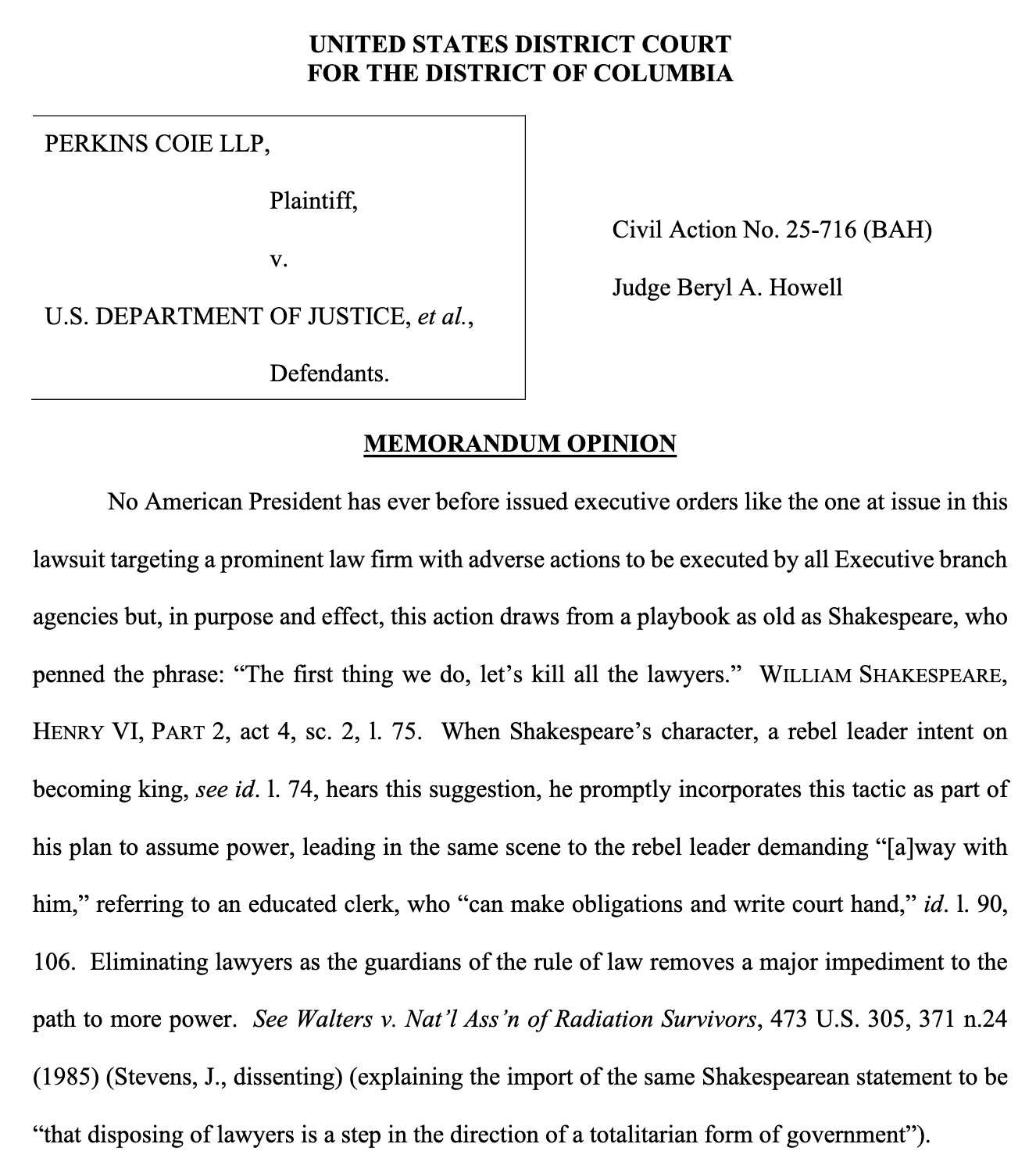
Legal Ethics Trivia
From the Texas Center for Legal Ethics, here’s the question of the month: “Can a lawyer ethically agree not to represent certain clients?” Test yourself at this website where you can read a short hypothetical, select an answer, and see your results. So far, out of 167 responses, 45% have gotten it right. Will you?

Get Hired
Did you miss the 100+ job postings from previous weeks? Find them all here.
- Assistant Ethics Counsel, Virginia State Bar — Richmond. From the posting: “The Virginia State Bar has an immediate opening for an experienced attorney to work as an Assistant Ethics Counsel. The VSB Ethics department attorneys advise bar members, judges, and out-of-state attorneys through the ethics hotline on a variety of professional regulation issues, including legal ethics, lawyer advertising, and unauthorized practice of law. They also develop and present CLEs, interpret statutes and rules relating to legal ethics, draft legal ethics opinions and rule amendments, and provide counsel and support to assigned committees, task forces and work groups.” Learn more and apply here.
- Conflicts Analyst, Husch Blackwell — Milwaukee. From the posting: “The Conflicts Analyst is responsible for handling all conflicts-related functions as part the initial intake of new clients/matters and the production of the conflict results report, and also assists with the coordination and documentation for resolving potential conflicts of interest.” Learn more and apply here.
- Conflicts Attorney, O’Melveny — East Coast. From the posting: “O’Melveny has an immediate opening for a Conflicts Attorney. This role can be based out of any of our East Coast offices. The Conflicts Attorney is responsible for conflicts clearance review and analysis for firm-wide legal hires and new business, working directly with the General Counsel and Conflicts Manager, as well as with firm attorneys and conflicts analysts, to identify and resolve potential ethics and business conflict issues. This position requires strong knowledge of the rules of professional responsibility and sound analysis of potential conflict issues. Firm attorneys and the General Counsel rely upon the Conflicts Attorney’s information in making decisions about whether or not to accept new legal hires, clients, and matters.” Learn more and apply here.
- Conflicts Counsel, Holland & Hart — Cheyenne, Wyoming. From the posting: “The Conflicts Counsel focuses on clearing conflicts of interest in accordance with the Rules of Professional Conduct and firm policy. Conflicts Counsel safeguards the firm’s reputation and plays a critical role in supporting the Department’s risk management function by ensuring that the firm and its lawyers do not inadvertently violate conflict of interest rules that govern the firm’s representation of clients and that firm policies and procedures are honored, thereby protecting the firm from potential malpractice claims, motions to withdraw, return of fees, loss of reputation and the like.” Learn more and apply here.
- Conflicts & Ethics Analyst, King and Spaulding — Atlanta/Remote. From the posting: “Perform a conflicts database search and prepare a conflict report and analysis of conflict information to facilitate new business intake review and lateral hiring. Review conflict hits, removing inapplicable results, and raising any potential conflicts to the Department’s attorney team. Understand the Rules of Professional Conduct and evaluate potential legal or business conflicts presented by new business coming to the firm.” Learn more and apply here.
- Conflicts & Ethics Attorney, King and Spaulding — Atlanta/Remote. From the posting: “Review the Firm’s new business intake forms and related documents, including conflict reports and engagement terms to identify and resolve business and ethical conflicts and to ensure compliance with Firm policies before matter opening. Draft and review waiver letters, engagement letters, and communicate with lawyers and staff on any changes or additional information that may be necessary before the Firm can accept the new business. Work closely with the Associate Director of New Business Intake and a team of Conflicts & Ethics Attorneys. Advise on issues under the rules of professional responsibility.Learn more and apply here.” Learn more and apply here.
- Conflicts & Ethics Specialist, King and Spaulding — Riyadh, Saudi Arabia. From the posting: “We are seeking a Conflicts & Ethics Specialist to join our Conflicts & Business Review Department, which is part of the firm’s General Counsel’s Office.” Learn more and apply here.
- Conflicts Staff Attorney, Cooley — Chicago, New York, Los Angeles, Santa Monica, Palo Alto, Washington DC, San Francisco, San Diego. From the posting: “he business intake and conflicts function is essential to the firm’s (1) compliance with (a) ethical obligations prevailing in jurisdictions in which the firm maintains offices and in which it practices and (b) the firm’s Risk Management policies and procedures, (2) avoidance of malpractice claims and ethical violations, and (3) ability to onboard new business, in the form of new clients and new matters for existing clients, new timekeepers and new employees in a timely fashion.” Learn more and apply here.
- Deputy Ethics Counsel, New Jersey Courts — Ewing. From the posting: “The Office of Attorney Ethics (OAE) acts as the investigative and prosecutorial arm of the Supreme Court of New Jersey in discharging the Supreme Court’s constitutional responsibility to supervise and discipline New Jersey attorneys.” Learn more and apply here.
- Legal Advisor, California Supreme Court Committee on Judicial Ethics — Remote. From the posting: “This position assists the committee in: Preparing formal, informal, and expedited written opinions; Drafting memoranda, opinions, advice, and other documents; Reviewing, evaluating, and analyzing pertinent documents, questions, and requests for advice in order to evaluate and assess the ethical issues, and the scope and complexity of inquiries received; Researching the applicable law contained in the Code of Judicial Ethics, statutes, constitutions, and precedent.” Learn more and apply here.
- Legal Conflicts Senior Analyst, Holland & Knight — Remote. From the posting: “The Lateral Conflicts Senior Analyst will identify and resolve conflicts of interest associated with the hiring of new attorneys and staff candidates. Periodic in-person presence is required for annual or bi-annual weekend team-building events. Attendance at in-person quarterly meetings may also be required, depending on a person’s location. Lateral Conflicts Analysts can be based within a reasonable commuting distance of any of our U.S. offices.”Learn more and apply here.
- Senior Attorney, Ethics and Advertising, The Florida Bar — Tallahassee. From the posting: “The Florida Bar’s Ethics & Advertising, Tallahassee, Florida, is seeking an experienced Senior Attorney. The Senior Attorney provides oral and written ethics opinions providing advice on ethics issues to Bar members, reviews attorney advertising for compliance with the Rules Regulating The Florida Bar, and assists in working with various bar committees.” Learn more and apply here.
- Senior Attorney, Lawyer Regulation Headquarters, The Florida Bar — Tallahassee. From the posting: “The Florida Bar’s Lawyer Regulation Headquarters-Tallahassee is seeking an experienced Trial Attorney. The Senior Attorney acts as counsel at investigative and trial levels of processing grievances against attorneys.” Learn more and apply here.
- Special Counsel for Information Law, Ethics and Compliance — New York City. From the posting: “The NYC Law Department is establishing a new position of Special Counsel for Information Law in our Ethics and Compliance Division.” Learn more and apply here.
Upcoming Ethics Events & Other Announcements
Did you miss an announcement from previous weeks? Find them all here.
2025
- May 7. Michigan Attorney Discipline Board hearings begin for seven lawyers involved in a failed 2020 election challenge. Learn more here.
- May 12, 2-5PM. A Conversation on the ABA Accreditation of Texas Law Schools. Register here for this free, virtual CLE event. I’ll be speaking along with David Brennen (Chair of the ABA Council Section of Legal Education and Admission to the Bar), Nikia Gray (Executive Director of National Association of Law Placement), David Harrell, (President of the Houston Bar Association), Nathan Hecht (27th Chief Justice of the Supreme Court of Texas and Member of the ABA Council Section of Legal Education and Admissions to the Bar), Austen Parrish (President of the Association of American Law Schools), Jennifer Rosato Perea (Managing Director of the ABA Council Section of Legal Education and Admission to the Bar) and others.
- May 22, 1-2PM. UPL Functions and Regulations in the Era of AI. Register here for this free webinar hosted by the University of Denver’s Institute for the Advancement of the American Legal System.
- May 28-30. 50th ABA National Conference on Professional Responsibility in Washington DC. I’ll be there! Join me along with Myles Lynk, Doug Ende, and Gary Ratner on Friday, May 30, for our panel “How to Proceed?: Addressing the Public’s Interest and the Profession’s Concerns When Disciplinary Complaints Are Based on Public Information, Not Personal Knowledge.” Learn more and register here.
- June 5, 2-3PM. Paths Forward: A Phased Approach to Regulating AI in Consumer-Facing Legal Tools. Register here for this free webinar hosted by the University of Denver’s Institute for the Advancement of the American Legal System.
- August 7-9. Association of Professional Responsibility Lawyers Annual Meeting in Toronto. Learn more here.
2026
- December 2-4. International Legal Ethics Conference at the University of Houston. Learn more here.
Keep in Touch
- News tips? Announcements? Events? A job to post? Reading recommendations? Email [email protected] – but be sure to subscribe first, otherwise the email won’t be delivered.
Renee Knake Jefferson holds the endowed Doherty Chair in Legal Ethics and is a Professor of Law at the University of Houston. Check out more of her writing at the Legal Ethics Roundup. Find her on X (formerly Twitter) at @reneeknake or Bluesky at legalethics.bsky.social.